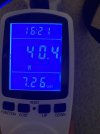I'm not sure what folks are using to measure power draw. I have 6 1L proxmox nodes, a synology 1821, and some networking hardware hooked up to two UPSs, which collectively show about 270 watts (much of that is the NAS). For myself, I didn't notice this noticeably change when I changed my C-state settings.
coretemp-isa-0000
Adapter: ISA adapter
Package id 0: +58.0°C (high = +80.0°C, crit = +100.0°C)
Core 0: +58.0°C (high = +80.0°C, crit = +100.0°C)
Core 1: +57.0°C (high = +80.0°C, crit = +100.0°C)
Core 2: +58.0°C (high = +80.0°C, crit = +100.0°C)
Core 3: +56.0°C (high = +80.0°C, crit = +100.0°C)
Core 4: +56.0°C (high = +80.0°C, crit = +100.0°C)
Core 5: +58.0°C (high = +80.0°C, crit = +100.0°C)
Core 6: +56.0°C (high = +80.0°C, crit = +100.0°C)
Core 7: +56.0°C (high = +80.0°C, crit = +100.0°C)
I am using a standalone plug that my NAS plugs into that shows me the power consumed fairly cheap device. 40W idle with C-states enabled, 120w idle with C-states disabled
https://www.amazon.com/dp/B09BQNYMMM
Your temps are quite a bit higher then mine idle but it's what I would expect with C-states disabled. Which CPU model do you have? Mine is the I9-13900
root@HOME-SERVER:~# sensors
coretemp-isa-0000
Adapter: ISA adapter
Package id 0: +40.0°C (high = +80.0°C, crit = +100.0°C)
Core 0: +36.0°C (high = +80.0°C, crit = +100.0°C)
Core 4: +35.0°C (high = +80.0°C, crit = +100.0°C)
Core 8: +37.0°C (high = +80.0°C, crit = +100.0°C)
Core 12: +36.0°C (high = +80.0°C, crit = +100.0°C)
Core 16: +35.0°C (high = +80.0°C, crit = +100.0°C)
Core 20: +36.0°C (high = +80.0°C, crit = +100.0°C)
Core 24: +34.0°C (high = +80.0°C, crit = +100.0°C)
Core 28: +37.0°C (high = +80.0°C, crit = +100.0°C)
If this continues to hold up I will turn a couple E-cores on and see where it crashes. It would appear to me the issue is C-states with E-cores.
powerstat doesn't appear to be that accurate just my observation. The below is actually consuming 40w
Code:
Time User Nice Sys Idle IO Run Ctxt/s IRQ/s Fork Exec Exit Watts
19:40:59 0.1 0.0 0.0 99.9 0.0 1 296 175 0 0 0 3.24
19:41:00 0.1 0.1 0.1 99.8 0.0 1 274 172 0 0 0 3.09
19:41:01 0.1 0.0 0.1 99.8 0.0 2 392 187 2 1 2 3.19
19:41:02 0.3 0.0 0.4 99.3 0.0 1 492 426 7 3 6 4.24
19:41:03 0.2 0.0 0.8 99.0 0.0 1 774 428 19 17 19 4.00
19:41:04 0.1 0.0 0.1 99.8 0.0 1 351 251 0 0 0 3.22
19:41:05 0.0 0.0 0.1 99.9 0.0 1 293 170 0 0 0 3.03
19:41:06 0.1 0.0 0.0 99.9 0.0 1 288 182 0 0 0 3.41
19:41:07 0.1 0.0 0.0 99.9 0.0 1 244 161 0 0 0 3.10
19:41:08 0.1 0.0 0.1 99.8 0.0 1 336 210 0 0 0 3.42
19:41:09 0.0 0.0 0.0 100.0 0.0 1 315 158 0 0 0 2.98
19:41:10 0.0 0.0 0.0 100.0 0.0 1 221 137 0 0 0 2.90
19:41:11 0.0 0.0 0.0 100.0 0.0 1 259 164 0 0 0 3.22
19:41:12 0.5 0.0 0.4 99.1 0.0 2 661 472 8 4 9 4.67
Average 0.1 0.0 0.1 99.7 0.0 1.1 371.1 235.2 2.6 1.8 2.6 3.41
GeoMean 0.0 0.0 0.0 99.7 0.0 1.1 345.9 215.0 0.0 0.0 0.0 3.37
StdDev 0.1 0.0 0.2 0.3 0.0 0.3 157.1 111.4 5.2 4.4 5.3 0.50
-------- ----- ----- ----- ----- ----- ---- ------ ------ ---- ---- ---- ------
Minimum 0.0 0.0 0.0 99.0 0.0 1.0 221.0 137.0 0.0 0.0 0.0 2.90
Maximum 0.5 0.1 0.8 100.0 0.0 2.0 774.0 472.0 19.0 17.0 19.0 4.67
-------- ----- ----- ----- ----- ----- ---- ------ ------ ---- ---- ---- ------
Summary:
CPU: 3.41 Watts on average with standard deviation 0.50
Note: power read from RAPL domains: uncore, package-0, core.
These readings do not cover all the hardware in this device.



